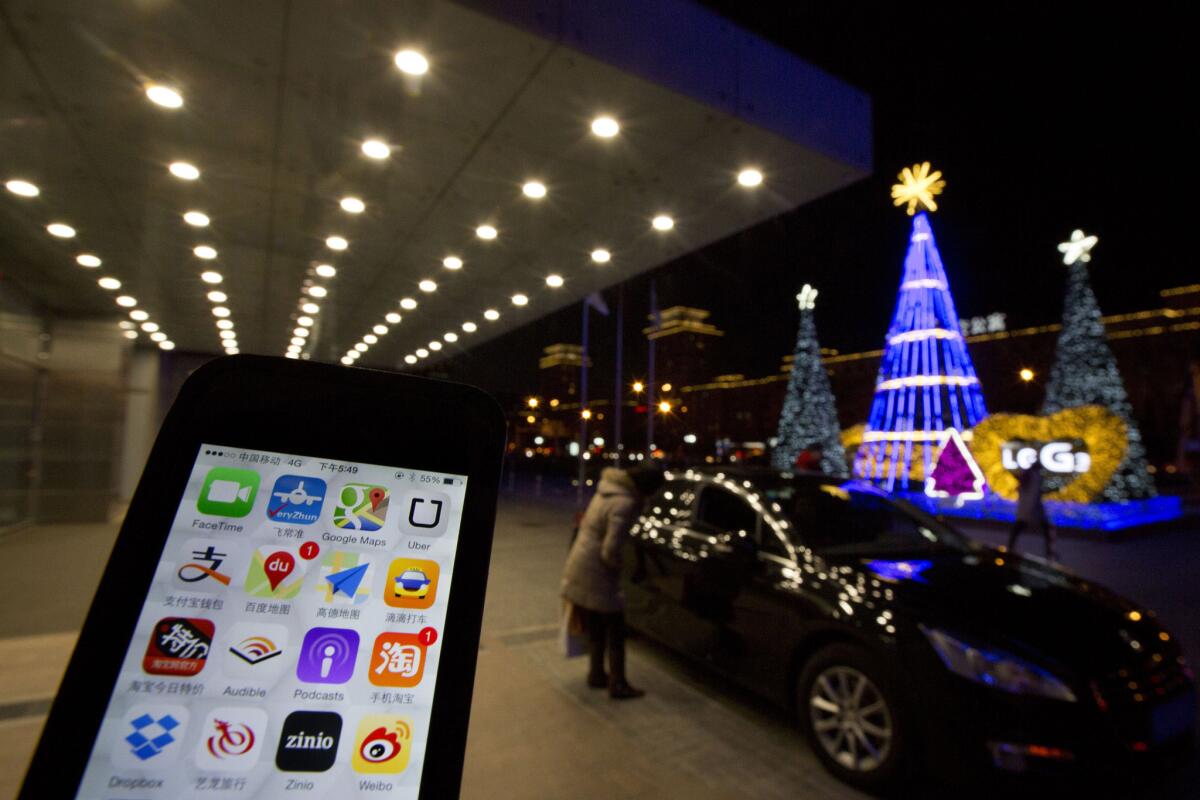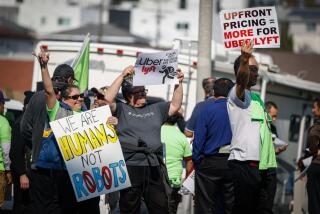Cab drivers strike across China over low wages, high fees and apps

Reporting from Beijing — Thousands of Chinese cab drivers in at least seven cities have gone on strike in the last two weeks, angry about low wages, high franchise fees to taxi companies and growing competition from ride-hailing apps including San Francisco-based Uber.
Local media said the work stoppages amount to the largest series of cab strikes in China’s recent history. The state-run New China News Agency quoted officials from the Ministry of Transportation as promising to unveil a reform plan aimed at establishing a “modern transportation system,” but no further details were given.
In recent years, the difficulty of flagging down a cab has spurred the development of an array of smartphone-based taxi-hailing apps. These include Didi Dache, backed by Internet giant Tencent, and Kuaidi Dache, supported by Tencent rival Alibaba. Both services have recently raised hundreds of millions of dollars in funding.
But the continuing shortage of cabs, as well as complaints about their poor cleanliness and service, has drawn a large number of consumers to new software that connects commuters directly with other ride options. These include Uber, which recently announced a cooperation agreement with Internet search firm Baidu, as well as similar programs built by Chinese companies.
Confronted with stagnant wages and higher costs of operation, many cabbies see the new apps as a serious threat.
The strikes began in the northeastern city of Shenyang on Jan. 4, and were echoed in a number of other cities. Cab drivers in Changchun blocked traffic with their cars for two days, and hundreds of drivers in Sichuan and Jiangxi provinces joined in.
The Global Times newspaper reported on Jan. 8-9, that drivers in Nanjing, the capital of Jiangsu province, gathered around the city’s train stations, bus stations and airport and refused to drive, leaving travelers scrambling to find alternate methods of transportation. The protests reportedly grew violent as some drivers turned on fellow cabbies who continued to take fares, vandalizing their taxis.
The newspaper noted that the protest was sparked by the city’s decision to scrap a fuel surcharge that had passed on higher fuel costs to cab customers. Beijing also eliminated its fuel surcharge this week.
Liu Dong, a cab driver in the northeastern city of Shenyang, told state-run CCTV that he was frustrated with the rise of alternative ride services.
“I didn’t make much money even before private cars came into picture,” he said. “I had to hand over nearly half of my fare receipts to the fleet company from which I rented my vehicle.”
Liu’s complaints are common among cab drivers. On Thursday, the state-run China News Service quoted experts as saying that taxi companies were charging up to $1,450 a month to drivers for their cars.
Taxi drivers are required to pay franchise fees to local monopolies, usually state-owned, that own taxi licenses. Despite massive increases in population in recent years in some cities, the number of licenses has not kept pace. Beijing, for example, has only 67,000 taxis serving a population of just over 21 million.
Nor have wages kept up with the fee structure.
“I get up before 6 a.m. every morning and sit for about 14 hours a day, only to get 2,000 yuan [about $340] a month. That’s unbearable,” a driver in Nanjing told China Daily.
In an editorial, the Communist Party mouthpiece People’s Daily called for reform of the cab system. Meanwhile, the Ministry of Transportation introduced restrictions last week on other car services in cities across the country, saying some were unsafe and were cheating customers.
Some ride-share drivers have been blocked by authorities from operating in Beijing, and fined $3,320. But in a statement released after the move, Uber spokeswoman Huang Xue said “business is running as usual.” Uber said it is in compliance with regulations because it partners with local car rental and chauffeur services that already work with tourists and hotels.
But analysts say the ride-hailing services – some of which offer amenities such as snacks and Wi-Fi -- are meeting needs in the marketplace.
“Right now, regular taxi drivers are only meeting the lowest bar of service,” said Chen Yanyan, a professor at the Beijing University of Technology’s School of Urban Transportation.
Taxi strikes are not infrequent in China, but labor protests appear to be on the rise in the country as discontent over increases in the cost of living and stagnant wages has grown.
According to data from China Labor Bulletin, there were 60 strikes in the transportation sector in the last quarter of 2014. The total number of demonstrations across all industry sectors in the final quarter of 2014 was three times as high as the same period in 2013, the group said in a report this week.
Silbert is a special correspondent. Tommy Yang in The Times’ Beijing bureau contributed to this report.
More to Read
Sign up for Essential California
The most important California stories and recommendations in your inbox every morning.
You may occasionally receive promotional content from the Los Angeles Times.










